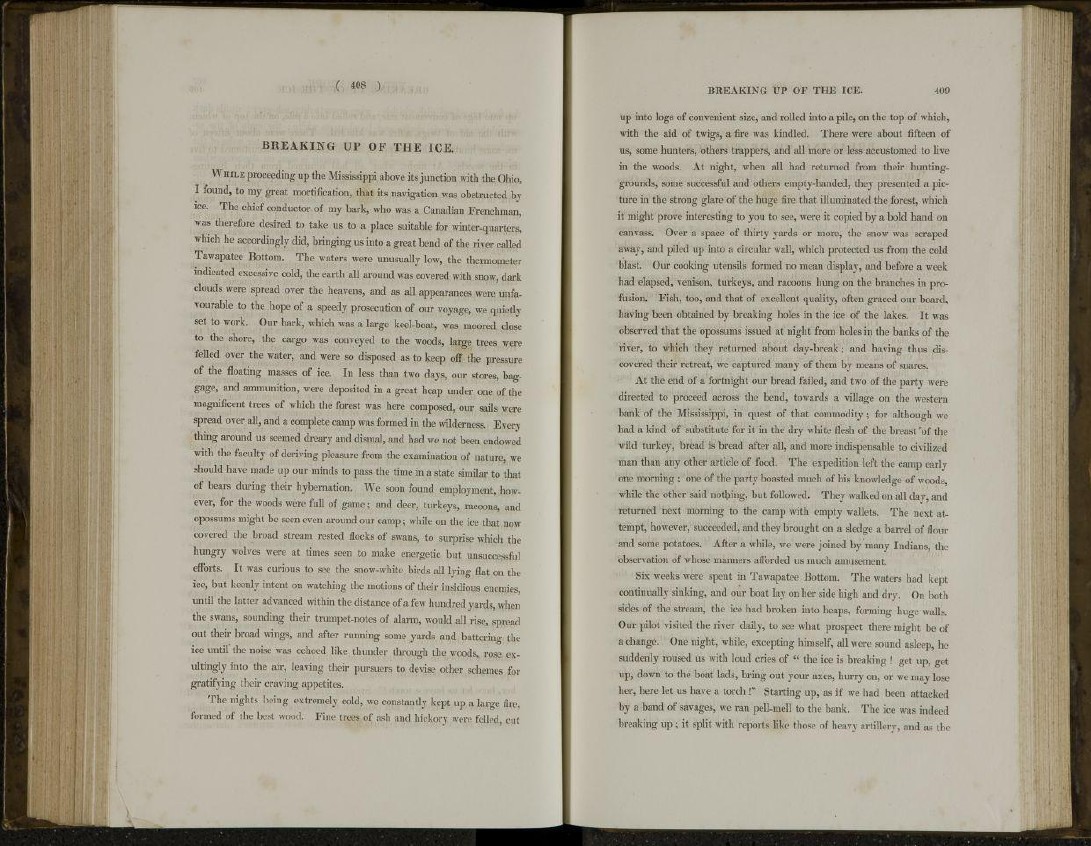
BREAKING UP OF THE ICE.
WHILE proceeding up the Mississippi above its junction with the Ohio,
I found, to my great mortification, that its navigation was obstructed by
ice. The chief conductor of my bark, who was a Canadian Frenchman,
was therefore desired to take us to a place suitable for winter-quarters,
which he accordingly did, bringing us into a great bend of the river called
Tawapatee Bottom. The waters were unusually low, the thermometer
indicated excessive cold, the earth all around was covered with snow, dark
clouds were spread over the heavens, and as all appearances were unfavourable
to the hope of a speedy prosecution of our voyage, we quietly
set to work. Our bark, which was a large keel-boat, was moored close
to the shore, the cargo was conveyed to the woods, large trees were
felled over the water, and were so disposed as to keep off the pressure
of the floating masses of ice. In less than two days, our stores, baggage,
and ammunition, were deposited in a great heap under one of the
magnificent trees of which the forest was here composed, our sails were
spread over all, and a complete camp was formed in the wilderness. Every
thing around us seemed dreary and dismal, and had we not been endowed
with the faculty of deriving pleasure from the examination of nature, we
should have made up our minds to pass the time in a state similar to that
of bears during their hybernation. We soon found employment, however,
for the woods were full of game; and deer, turkeys, racoons, and
opossums might be seen even around our camp; while on the ice that now
covered the broad stream rested flocks of swans, to surprise which the
hungry wolves were at times seen to make energetic but unsuccessful
efforts. It was curious to see the snow-white birds all lying flat on the
ice, but keenly intent on watching the motions of their insidious enemies,
until the latter advanced within the distance of a few hundred yards, when
the swans, sounding their trumpet-notes of alarm, would all rise, spread
out their broad wings, and after running some yards and battering the
ice until the noise was echoed like thunder through the woods, rose cxultingly
into the air, leaving their pursuers to devise other schemes for
gratifying their craving appetites.
The nights being extremely cold, we constantly kept up a large fire,
formed of the best wood. Fine trees of ash and hickory were felled, cut
up into logs of convenient size, and rolled into a pile, on the top of which,
with the aid of twigs, a fire was kindled. There were about fifteen of
us, some hunters, others trappers, and all more or less accustomed to live
in the woods. At night, when all had returned from their huntinggrounds,
some successful and others empty-handed, they presented a picture
in the strong glare of the huge fire that illuminated the forest, which
it might prove interesting to you to see, were it copied by a bold hand on
canvass. Over a space of thirty yards or more, the snow was scraped
away, and piled up into a circular wall, which protected us from the cold
blast. Our cooking utensils formed no mean display, and before a week
had elapsed, venison, turkeys, and racoons hung on the branches in profusion.
Fish, too, and that of excellent quality, often graced our board,
having been obtained by breaking holes in the ice of the lakes. It was
observed that the opossums issued at night from holes in the banks of the
river, to which they returned about day-break; and having thus discovered
their retreat, we captured many of them by means of snares.
At the end of a fortnight our bread failed, and two of the party were
directed to proceed across the bend, towards a village on the western
bank of the Mississippi, in quest of that commodity ; for although we
had a kind of substitute for it in the dry white flesh of the breast 'of the
wild turkey, bread is bread after all, and more indispensable to civilized
man than any other article of food. The expedition left the camp early
one morning ; one of the party boasted much of his knowledge of woods,
while the other said nothing, but followed. They walked on all day, and
returned next morning to the camp with empty wallets. The next attempt,
however, succeeded, and they brought on a sledge a barrel of flour
and some potatoes. After a while, we were joined by many Indians, the
observation of whose manners afforded us much amusement.
Six weeks were spent in Tawapatee Bottom. The waters had kept
continually sinking, and our boat lay on her side high and drv. On both
sides of the stream, the ice had broken into heaps, forming huge walls.
Our pilot visited the river daily, to see what prospect there might be of
a change. One night, while, excepting himself, all were sound asleep, he
suddenly roused us with loud cries of " the ice is breaking ! get up, get
up, down to the boat lads, bring out your axes, hurry on, or we may lose
her, here let us have a torch !" Starting up, as if we had been attacked
by a band of savages, we ran pell-mell to the bank. The ice was indeed
breaking up ; it split with reports like those of heavy artillery, and as the